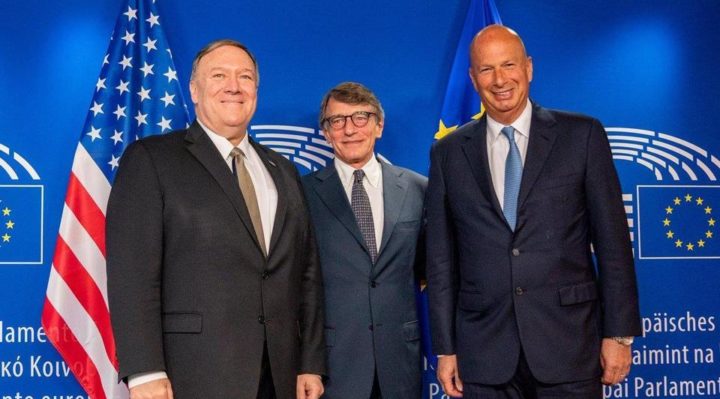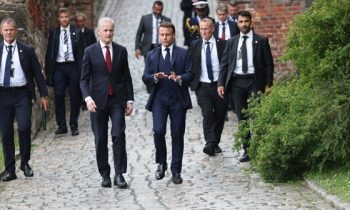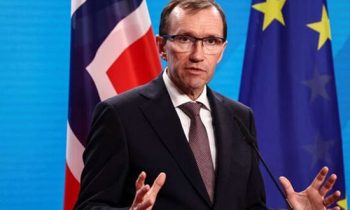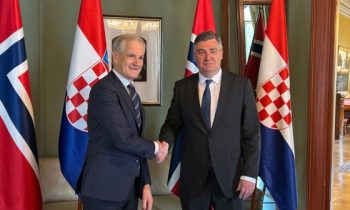The US is confident of a reset in transatlantic relations when a new EU leadership takes office later this year, Washington’s top envoy to Brussels said on Tuesday.
US Ambassador to the European Union Gordon Sondland told reporters that a series of meetings this week between US Secretary of State Mike Pompeo and the EU’s incoming top officials went “extraordinarily well”.
US and Europe have been caught up in a series of feuds over trade, Brexit, ties with Iran and climate change that Europe blames on the go-it-alone diplomacy of President Donald Trump.
“The secretary made this trip solely and exclusively to see the four EU leaders with the objective of resetting our relationship,” Sondland said after Pompeo’s meetings.

Below is a full rush transcript of the press conference by Ambassador Gordon Sondland, U.S. Ambassador to the European Union.
Ambassador Sondland: I just finished yesterday evening a very successful round of meetings with the four incoming European Union leaders. President Elect von der Leyen; President Charles Michel; President David Sassoli; and designee Josep Borrell.
Secretary Pompeo and I were very, very pleased with the outcome of those meetings. The chemistry was good. They were warm and friendly. We talked about the necessity to get our relationship back on track again. Everyone agreed. We talked about some of the issues, and there was far less daylight between us on the issues that were brought up by both sides than there may have been in the past. Whether that’s just a change in the personalities or a change in policy, and we have yet to see.
But we felt very good about the meetings. I took Secretary Pompeo back to the airport, and he was very pleased to have made the trip.
Question: I wanted to ask you about the point you made in your opening remarks, and you also said recently you would like to try and reset the relationship with the EU. Could you spell out a bit on what substance there is to that given the very wide differences between the EU and Donald Trump when it comes to Iran, when it comes to trade or climate change to take three big issues. How do you see that reset taking place when those very big policy differences remain?
Ambassador Sondland: Well, very good question. one of the things that we noticed in our conversations with all four leaders is that the policy differences are not necessarily as great as they are portrayed in the media. Our objectives for all of the things you mentioned are not dissimilar. It’s the tactics and the process that we have differences on.
The JCPOA in Iran is a prime example. We both want Iran to join the community of nations. We want them to stop the malign activities. We want them to stop missile proliferation. We want them to behave as good citizens of the world, do business with them, have diplomatic relations with them, and treat them like any, quote, normal country. So that’s an objective we both share. It’s how we get to that objective where we have differences.
As I mentioned in my opening remarks, I believe that there’s going to be less emphasis by the new leadership on our difference in tactics and more emphasis on the objectives and the outcome, and that’s where we’ll find common ground and be able to work together. By both utilizing our own version of the tactics that we would prefer to employ, and not getting into disagreements about those, but focusing on the outcome.
Question: Mr. Ambassador, you already spoke about a possible reset of the relations with the European Union. Can you give us an example of what specifically the United States would like to accomplish in the relationship with the EU?
Ambassador Sondland: I think we want to accomplish a host of things.
First of all, we want to dispense with some of the invective that’s been going in both directions and get back to a more productive relationship which should be a fairly straightforward thing to do.
The next thing is, as I said yesterday in my press conference, we want to identify some low-hanging fruit on whether it’s trade issues, whether it’s Iran, whether it’s Venezuela, whether it’s China, whether it’s 5G, and we want to identify those areas where we can reach some quick preliminary agreement to build some more trust and confidence in the relationship, and dispense with those things so we can move on to the tougher stuff.
Question: I wanted to ask you about the WTO process and the arbitrator’s decision on the aircraft subsidies issue. Do you know when you expect that arbitrator to rule on what tariffs can be imposed? What level of tariffs can be imposed by the U.S.? And does the United States intend to utilize that full scope, impose those tariffs? Or is there some possibility that you could as the Europeans have suggested and asked, negotiate a settlement since they also are waiting for a decision on what’s available to them in terms of punitive tariffs?
And then secondly, I wanted to ask you quickly about the, also on the WTO, whether the United States has in fact agreed now to appoint a judge to the appellate body as Forest Johnson said yesterday?
Ambassador Sondland: To your last question, I would refer you to the U.S. Trade Representative because that’s really within his purview to make the decision about an appointment of a judge.
As far as the judgment is concerned or the number that we’re waiting for, we’ve been waiting for it for quite some time. They’ve been greatly delayed in getting that number out and we’re hoping it’s forthcoming in the next week or two.
As to the tariffs, as you know, the WTO mechanism provides that tariffs are the way that you recover the damages. The purpose of these judgments from the WTO is to curtail the behavior that was originally complained about. So, in this case it’s launch aid that various countries gave to Airbus. We want them to stop the launch aid. And the launch aid damages are being computed by the WTO and once we know what those damages are, our hope is to recover them through the normal mechanisms.
In terms of making a deal, that’s always on the table. You can always negotiate a settlement. We’ve had some informal conversations about negotiating a settlement even prior to the number coming out, and those have really gone nowhere. But I think the process is we get the number and then the President with the advice of the United States Trade Representative decides what the appropriate level of sanctions is or tariffs, I should say, I misspoke. Tariffs. You know, if any. That’s completely up to the President.
Question: Mr. Ambassador, I asked you a question yesterday concerning the meeting of Secretary Pompeo with Josep Borrell, upcoming High Representative, who will most likely deal with the dialogue between Kosovo and Serbia. Was there a topic of discussion? And will there be any direct involvement of Mr. Matthew Palmer in his new capacity as Special Envoy for Balkans in the actual talks between Kosovo and Serbia?
Ambassador Sondland: Mr. Palmer will report directly to Secretary Pompeo, and it will be up to Secretary Pompeo to task Mr. Palmer as to what exactly he’s going to be working on. But the bottom line is, we want to lean into the Balkans and really help solve all of the problems that have been identified. That’s one of the reasons Mr. Palmer was appointed.
We had some very productive discussions with Mr. Borrell and the other three about these issues, and we intend to work very closely together and offer our full support.
Question: I have a question on the past EU Commission and the other leaders. What processes were so much disturbed by? Why you say you need a ‘reset’? I remember President Juncker having a very nice conversation in July 2018, bringing even to a partial agreement, so what are you complaining about, about the past leadership?
Ambassador Sondland: First of all, I’m not disturbed and I’m not complaining. I’m stating facts. We really haven’t gotten very far in any of the initiatives we’ve tried to undertake with the EU. We’ve gotten a lot of pushback. We’ve gotten a lot of no’s. That could be member country policy, it could be the Commission, we don’t know what it is. But it’s been a very difficult year with the EU.
So, as I said yesterday, changing the members of the team might help break that log jam.
Question: I have a question on the European defense. Are you satisfied in terms of the United States demands on the European Defense Fund that’s been discussed within the EU? As well as on the permanent structured cooperation? And maybe if you have any idea in a way of how you’re seeing the European defense becoming a much and much bigger topic ?
Ambassador Sondland: A couple of comments on European defense. Number one, President Trump has been very clear that he would like to see our partners do more in terms of financial participation in their own defense. That having been said, when the Europeans spend money on defense, we want to be sure that the money they spend is completely harmonious with NATO. We don’t want them to spend money in places that don’t harmonize well with NATO’s missions. NATO is still the ultimate European peacekeeper, and we want Europe when they procure materiel, equipment, projects, we want them to buy the best out there.
Sometimes the best out there is manufactured in Europe, and sometimes the best out there is manufactured elsewhere, like in the United States. We don’t want protectionism just for the sake of spending money in Europe because, as I’ve said before and as others have said, our markets, DARPA and other procurement entities, are fairly open to considering European projects. But the proposed new legislation that Europe is contemplating is very troubling to us because the same amount of openness does not extend to the United States in reverse. So that bothers us. We want to see that fixed as quickly as possible because we really don’t believe the intent of Europe is to have the United States be wide open and have Europe be closed and protectionist. We don’t think that that’s the intent, but unfortunately, that’s what the language says, and it needs to get fixed.
Question: Did Secretary of State Pompeo raise the topic of Russian gas sales in his conversations with Ursula von der Leyen? If so, do you see any progress towards blocking Nord Stream 2 after all?
Ambassador Sondland: Well, look, energy independence for Europe has always been a big concern of the United States. We’ve been on record as not being in favor of Nord Stream 2 because we believe it puts too much control into Russian hands. The Russians have had a history of using that control in nefarious ways in the past and we want Europe to get their energy from lots of different places including the United States. We’re now going to be one of the largest suppliers of liquid natural gas in the world, and we want the Europeans to have lots of sources so that they’re not beholden to one entity. This type of material, I should say this subject matter was discussed with all of the leaders.
Question: I’d just like to know how the U.S. administration responds to Huawei’s claim that the U.S. government has launched cyber attacks to infiltrate Huawei’s internet and internal information systems. This was a claim made by the company yesterday.
Secondly, the founder of Huawei, Ren Zhengfei, recently revealed that it’s very likely Huawei equipment will be used in core 5G network infrastructure in the UK. What advice has the U.S. administration given to the British government about their relationship with Huawei? And how confident are you that the UK will take the U.S.’ advice seriously?
Ambassador Sondland: As to the first question, that’s classified and I’m not going to comment on classified matters.
As to the second question, the UK are some of our closest friends, and I think they take very seriously our concerns and advice and I’ll leave it at that. I think they are looking at everything with their eyes wide open. There are some big decisions to make but I think that we’re in close consultation and cooperation with them about not only Huawei but all security matters.
Question: I’m just curious what your impressions were of Mr. Borrell. I don’t know if you’ve answered this before, but he has said some interesting things in the past about American independence and lots of other things, and I wondered what impression you had of him ?
Ambassador Sondland: We had a terrific meeting with Josep Borrell. He was not only personally warm and friendly, he was looking forward to the working relationship with both myself and the Secretary.
His views expressed at 30,000 feet were surprisingly very complementary to ours. So notwithstanding what I’ve read in his past statements, he was surprisingly talking like a close friend and ally of the United States when we had this meeting yesterday.
Question: You mentioned that there’s a desire in the United States to reset relationships and that there was a warm atmosphere at your meeting. Does this mean that issues such as the threat of potential tariffs on EU cars is still current in the U.S.? And do you see the potential for a low-hanging fruit deal on, for example, conformity assessment issues coming soon? It seems to me that on the EU side the discourse is this is one of the easier deals to do. Whereas the tariff discussions are stuck.
What’s your assessment of the prospects of a deal and some form of reset? And where is this auto tariffs issue on the U.S. side?
Ambassador Sondland: Well, I think you’ve really asked two questions. One is the substance of our trade disagreements. The substance of our trade disagreements hasn’t changed. And the respective remedies on both sides haven’t changed, including the President’s ability, should he so desire, to impose auto tariffs. None of that has changed.
What I think could change is that with the right personalities these difficult issues can be worked through because they require a great deal of communication and engagement, and they require a great deal of trust between the negotiators. That’s probably what’s changed. Not the underlying substance. So the chemistry is a very important part of this and we’ve very cautiously optimistic based on these meetings that we’re going to be working with folks that are not going to roll over and give us what we want, but that are going to be thoughtful and constructive in the dialogue.
Question: I just wanted to ask whether Secretary Pompeo discussed any concrete ideas with President-elect von der Leyen on how to move forward in the trade talks. Whether they discussed a two-phased approach: first, industrial tariffs and then moved on to other issues such as agriculture and public procurement ?
Ambassador Sondland: No, the purpose of these meetings was not to dive into the issues. The purpose of the meetings was to set the right tone to get acquainted, to understand each other on a macro level and I think that having been the objective, it was accomplished very well.
Those types of conversations are going to be left to whomever gets the trade portfolio with the EU and our U.S. Trade Representative.
Question: I wanted to pick up on one point you made about you said there had been invective on both sides. A lot of the invective coming from the White House, from President Trump’s twitter account towards certain European politicians has not gone unnoticed.
Do you really expect that to change, given that you’re trying to reset relations? Could we expect to see a change in tone from President Donald Trump towards various European politicians? I’m thinking of how he’s referred to the European Competition Commissioner for example.
And secondly, if I may, on Iran, what do you think of Emmanuel Macron’s idea for a credit line to allow the Europeans to purchase oil? Do you think the U.S. would still sanction companies that would be seeking to buy Iranian oil? Is that one sort of way that this reset might work?
Ambassador Sondland: As to your first question, when I say invective, I’m not referring to the President. I think the President is free to express his frustration whenever he wants. I’m talking about more at the working level, and not at the leadership level.
And as to the Macron question, I think the U.S. government is studying that. As I said, our policy is maximum pressure on Iran. And that continues to be the policy. But the definition of maximum pressure is determined by the President. The President can dial that up and dial that down at his discretion. That’s one of the controls that he possesses as President.
So the line of credit issue is being looked at and we don’t really have any further comment at this point.
Ambassador Sondland: Yes. Thanks everyone for calling in. Just to wrap it up, we’re looking forward to a fruitful and productive engagement with the new EU leadership beginning in November. We intend to stay in close touch with all four leaders leading up to their appointments and swearing in, whatever the mechanism is. And we hope to ring in 2020 with a much better dialogue and friendship between the U.S. and the EU.
The basic partnership is unshakeable. We’re like a married couple that is going through some serious questions about each other, but at the end of the day we’re going to stay married and we’re going to make the marriage work and it’s going to be stronger for it. So, we’re very optimistic about the future with our partners, the EU, and our friends. Thank-you.



